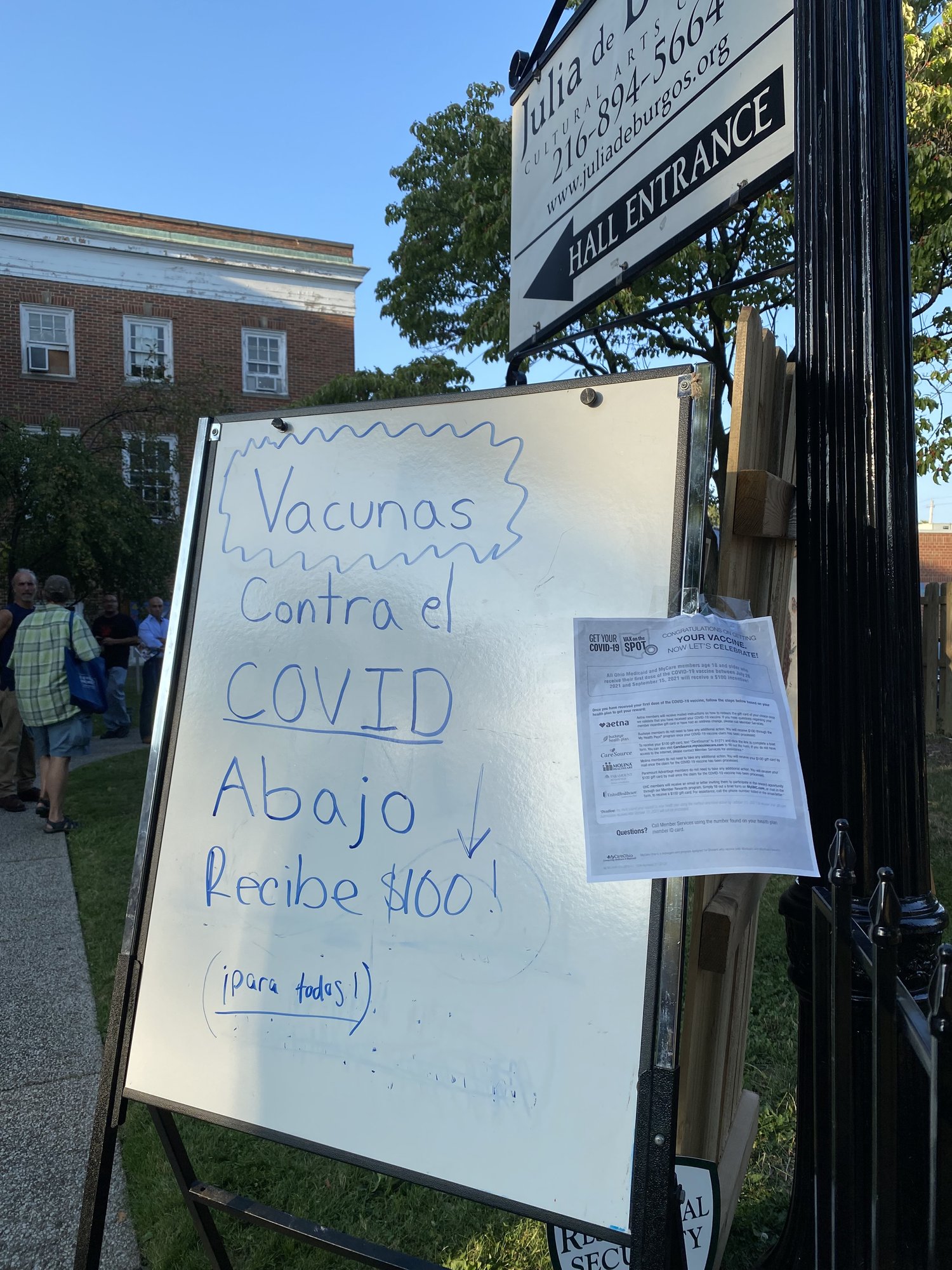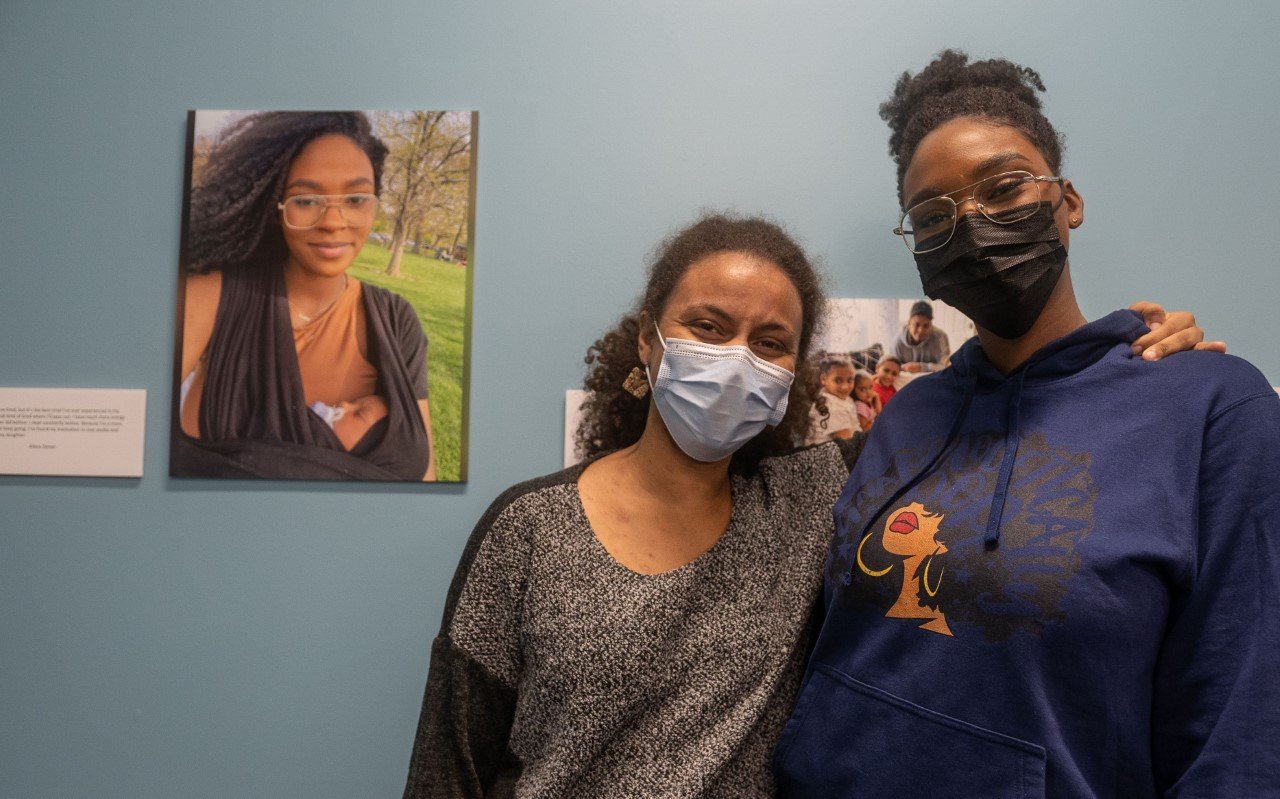Neighborhood Family Practice builds trust to vaccinate near west side’s marginalized communities

Neighborhood Family Practice earned one of the Ohio Commission on Hispanic Latino Affairs’ Nuestra Familia Awards “for winning the trust of Latino families and building relationships that lead to better health outcomes” last month, crowning the local healthcare company’s consistent efforts to serve Cleveland’s marginalized communities.
For more than 40 years, Neighborhood Family Practice (NFP) health centers have sought to foster health equity throughout the near west side of Cleveland. NFP was founded in 1980 specifically because residents in that part of the city lacked access to primary care.
Today, NFP provides primary care services at seven locations in a dozen neighborhoods across Cleveland’s west side. Unlike hospitals and other medical facilities, as one of six federally qualified health centers (FQHC) in the city, NFP’s mission is to serve a wide range of diverse and often marginalized or impoverished individuals and families.
“The network of FQHCs is basically the only game in town for poor people in urban areas and rural areas,” said Jean Polster, NFP’s President and CEO.
Polster said healthcare institutions still have a long way to go when considering residents from marginalized communities lack of trust in the medical model. She said patients commonly complain to her about unsatisfactory experiences with healthcare providers who were unfriendly, treated them or their families poorly, didn’t respect or listen to them, or were slow to respond at all — all of which erode their trust.
“We have to think about how health is represented in communities of color and how can they see healthcare is something to be a partner in instead of something to distrust,” she said. “Health equity is about how we regain people’s trust with their most private information and that you are sincerely going to help them on the road to recovery.”
Trust is the foundation for care
Since March 2020, NFP has prioritized its response to the Covid-19 pandemic. They knew they could only implement a significant effort to get people in the neighborhoods tested and vaccinated, especially in the Hispanic community, if they leveraged the strong sense of trust they have built and nurtured throughout the years. NFP quickly realized they needed to collaborate with community centers and churches where residents felt safe and comfortable enough to get vaccinated.

“NFP had this idea to supply the vaccines through venues that were familiar to the Hispanic community that turned out to be excellent,” said Maureen Dee, a member of the Hispanic Roundtable of Cleveland. “They picked La Sagrada Familia Church, which so many people know as a safe place, and they asked us to fill the appointments.”
Roundtable members used social media familiar to the Hispanic community to get the word out. Members also provided their personal cell phone numbers so they could respond to the calls in Spanish. Dee, who recently retired after working for Catholic Charities for 41 years, said she personally signed up 3,500 people for the vaccine.
“NFP is very well-known on the near west side, particularly with the Hispanic community because they have a staff who speak Spanish, so amongst the social services agencies, we have a history of working with NFP,” Dee said. “It was incredible how fast word of mouth spread and people started telling their cousins and family members and kids to sign up for the vaccine.”
Of the total 29,000 single vaccinations provided by NFP to date, roughly 30% were people of Hispanic origin. Approximately 70% of NFP’s patients are vaccinated compared to 43% of city of Cleveland residents. NFP recently started returning to the community to give booster shots, administering another 150 vaccinations at La Sagrada Familia.
That current vaccination rate for the city of Cleveland is lower than that of Cuyahoga County as a whole, which is now at about 64%. The rate in most Ohio counties hovers between 40% and 50%. Nationally, Ohio ranks around 10th with a vaccination rate at just under 55%.
New media campaign appeals to neighborhood residents
Recognizing that vaccination efforts are beginning to stall out even as cases rise and hospitalization rates increase, NFP rolled out a new strategy to reach the vaccine resistant. This December, NFP initiated a digital and print media campaign as part of its efforts to build trust through marketing imagery and languages that represent its diverse constituency on the near west side.
NFP hired a local minority female-owned marketing agency, CoCreative, to oversee the campaign.
“When communities see real people that represent the community they live in, not just stock images from 1998, that creates credibility, especially when it relates to health disparities, Covid vaccines, getting prenatal care, and so on,” said Frechic Burton, co-founder and brand strategist at CoCreative.
Using pregnancy care to develop trusted healthcare relationships
One of the most effective ways NFP has built long-term trust within the communities it serves has been through its compassionate, high-quality prenatal care services to young mothers and their families. NFP employs nurse midwives, with an OB/GYN available to support their prenatal and birthing care services.
Part of that prenatal care is NFP’s CenteringPregnancy program. The program’s group prenatal visits – held virtually now because of the pandemic – bring mothers together to provide education and support from others who are at their same stage of pregnancy.

NFP monitors two components when evaluating birth outcomes: the percentage of caesarean section births, which have a higher risk of complications and require longer, more painful recovery, and low-birth weight, a significant contributor to infant mortality.
In 2019, 13.5% of cleveland mothers gave birth to babies with low birth weights, Polster said. For NFP’s recent births, she said that rate was 4.7% and for African American mothers, it was 5.2%.
Currently, Ohio’s rate for caesarean births is approximately 20%, Polster said, and Cleveland’s rate hovers around 18%. According to the Centers for Disease Control, in 2020, one out of three births in the country (31.8%) were by caesarean, more than double what the World Health Organization recommends as the safe level: 10% to 15%. NFP’s rate of caesarean births is 8.6%.
“By paying attention, we are able to save a surgery for those women,” said Polster. “They’re having a non-caesarean birth, a nonsurgical birth, and it also helps those mothers really take control of their life and their pregnancy and their new motherhood or continued motherhood.” All of that increases their preference for and trust of having their procedures done by NFP medical staff, she said.
Additionally, NFP carefully tracks its rates for caesarean births in African American, Hispanic, and Asian populations. While NFP’s rate for African American mothers is highest, it has been down this past year, at 11.6%, compared to the 2019 statewide rate of 20%.
Overcoming language barriers
NFP has also sought to build trust by increasing its staff of interpreters. Polster believes Northeast Ohio will see an unprecedented number of new refugee arrivals. According to Polster, NFP estimates it will serve more than 1,600 refugees, who collectively speak almost 30 different languages, over the next year. NFP performs initial health screenings for refugees entering Cuyahoga County under a variety of refugee statuses.
Polster estimated that NFP spends a quarter of a million dollars a year in unreimbursed interpretation services, much of which is provided over the phone. But when NFP has enough patients to justify it, Polster said they hire translation specialists directly from the community.
NFP already employs Arabic, Bhutanese (Dzongkha), and Nepali speaking interpreters. They are also seeing an increased number of individuals who speak Swahili. NFP recently received an $86,600 Ohio Department of Health Centering Grant. It’s a continuation of a grant NFP currently has, but with additional funding for Swahili interpretation and marketing. The Swahili speaking cohort will begin in January 2022.
Like this story? Take our community impact survey here and support local journalism by becoming a member of The Land.
Christopher Johnston has published more than 3,000 articles in publications such as Christian Science Monitor, Scientific American and Time.com. His book, Shattering Silences: New Approaches to Healing Survivors of Rape and Bringing Their Assailants to Justice (Skyhorse) was published in February 2018.
